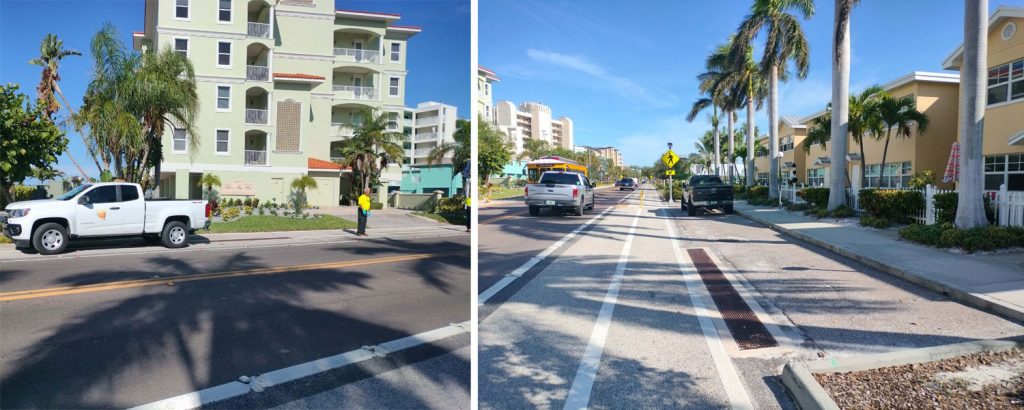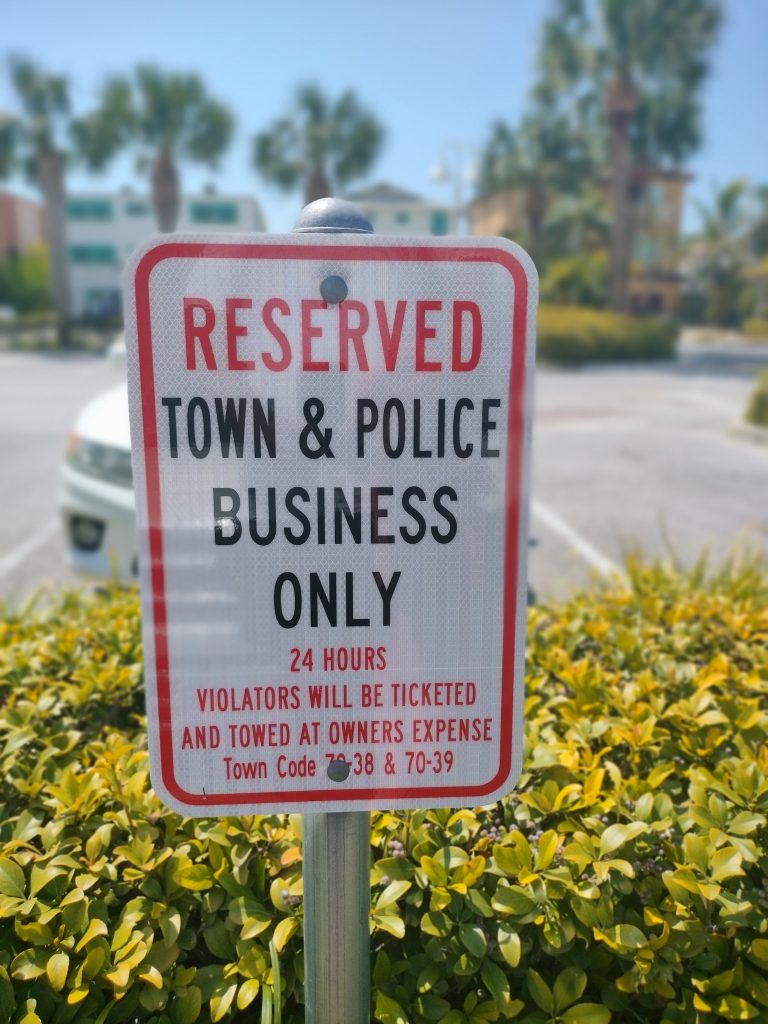An investigation by Tampa Bay Guardian found that the Indian Shores Police Department (ISPD) as a matter of de facto town policy allows certain motor vehicles to park in the bike and pedestrian lanes on Gulf Blvd (State Road 699). Such parking creates multiple safety hazard, and could result in legal liability for the city. We also looked at the recently introduced parking fees in the town’s parking lot surrounding its town hall. We found that no parking tickets were issued in August. Despite not issuing tickets, town council doubled the cost of parking ticket in early September, raising the monetary spank from $50 to $100.
Florida Statute §316.1945 (1) states that no parking may occur in bicycle paths or sidewalk “except when necessary to avoid conflict with other traffic, or in compliance with law or the directions of a police officer or official traffic control device.” [bold-facing added].

Noting that Gulf Blvd. in Indian Shores has become a daily obstacle course of almost equestrian difficulty for pedestrians and bicyclists alike, we made a Florida Public records request to the town. We requested “records of ISPD officers directing vehicles to park in the bike lanes on SR 699 (Gulf Boulevard)” during the first 11 months of the current fiscal year. We did so because that it the only way such parking in the bike and pedestrian lanes would be legal: at the “directions of a police officer,” just as the statute says.
The Indian Shores Town Clerk responded that the police department search yielded “no results responsive to your request.”
In other words, during this almost year long period, not one vehicle parked in the bike lanes and sidewalks in the town was authorized to do so under the statute.
Should an accident occur where such lane blockages are involved, the town could be held legally liable due to its consistent non-enforcement of this state law. The town has argued “officer discretion,” but when something is done the same way 100% of the time, then it is no longer discretion. Then it is de facto policy.
We further observed multiple instances of town public works vehicles also parking in bike/pedestrian lanes. In the example shown below from September 5th, the employee did so despite free parking being available less than 30 ft away (shown below).
Therefore, we also asked for records of ISPD issuing citations against any town-owned vehicles in the last year. None were issued, meaning that ISPD lets civilian town employees obstruct bike/pedestrian lanes even when they have no reason to do so as in the below example.

ABOVE: Town of Indian Shores public works vehicle parked in and blocking southbound bicycle and pedestrian lanes. Second picture shows several parking spots available immediately across the street.
Town of Indian Shores ordinance 70-3 “Traffic circulation and transportation officer” subsection (3) states that the town’s “traffic and transportation officer” shall have as one of their duties to “promote the inclusion of pedestrian walkways and bicycle paths in all roadway design consideration.” Nowhere in Indian Shores’ code of ordinances does it say that those aforementioned “pedestrian walkways and bicycle paths” are actually meant for parking. Not even parking of town vehicles.
—————————————
Earlier this year, the town also decided to start charging $2.50 per hour for parking in its parking lot surrounding its town hall at a 19305 Gulf Blvd. That formerly free parking lot has been a favorite for beachgoers, and has also served as weekend and evening overflow parking for the extremely popular Salt Rock Grill restaurant that is located directly north of Town Hall.
Parking fees are imposed from 7 AM to 5 PM, seven days a week. These hours means that few evening Salt Rock patrons will pay, which is the time of day when overflow parking is needed for the restaurant. Instead, it is Indian Shores residents, their guests and other locals who end paying to park.
Just this month, town council decided to increase the fine for parking violations from $50 to $100. Yet a public records request made to the Town of Indian Shores showed that no parking tickets (=zero) had been issued during the month of August in the parking lot in question. Since $50 times zero is zero and $100 times zero is also zero, we will make further public records requests to get to the bottom of why the town is no longer enforcing the requirement to pay for parking.

In that parking lot there are free parking spots for the mayor, city council members, and various city staff, including police. There are also spots reserved for “Town & Police Business Only” and the sign for that cites certain city ordinances. The sign can be read to mean that only those carrying out Town & Police can park there, or that the public can park there if they have “Town & Police” business. Do they have to have both, or should it read “Town or Police business?” It’s not clear.
The ordinances cited on these signs do not dispel any of the confusion. Indian Shores Ordinance 70-38 “Parking Prohibitions” subsection (g) “Metered parking” states that “all parking in town-owned parking lots shall be metered” except free spots for “town employees, residents, and property owners…with a properly displayed permit.”
Since the ordinance says that “all parking” shall (=must) be metered, it is quite apparent that non-resident persons who own no property and who park in such a spot must pay to park. They would have to pay, even if they had business in town hall, or wanted to attend a public meeting.
Or should such unfavored people instead rely on “officer discretion” and hope they don’t incur a $100 parking ticket?
We will investigate further to see what is going on in this formerly amiable town. However, and as always, the Guardian reports and the readers decide. Please like our Facebook page to find out when we publish our articles.


